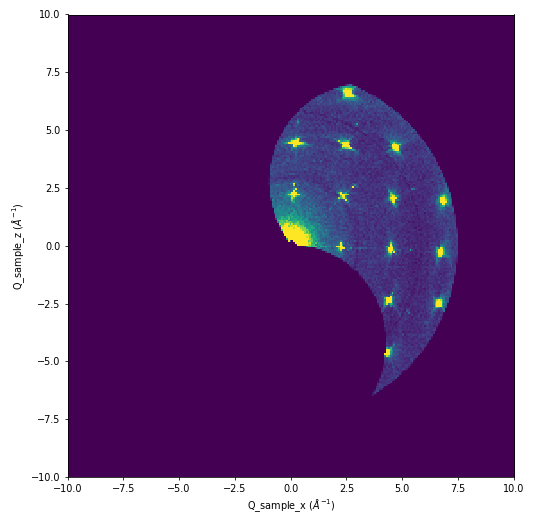ConvertHFIRSCDtoMDE v1¶
Summary¶
Convert from the detector vs scan index MDHistoWorkspace into a MDEventWorkspace with units in Q_sample.
See Also¶
Properties¶
Name |
Direction |
Type |
Default |
Description |
|---|---|---|---|---|
InputWorkspace |
Input |
IMDHistoWorkspace |
Mandatory |
An input workspace. |
Wavelength |
Input |
number |
Mandatory |
Wavelength |
LorentzCorrection |
Input |
boolean |
False |
Correct the weights of events or signals and errors transformed into reciprocal space by multiplying them by the Lorentz multiplier: \(sin(2\theta)cos(\phi)/\lambda^3\) |
MinValues |
Input |
dbl list |
-10,-10,-10 |
It has to be 3 comma separated values, one for each dimension in q_sample.Values smaller then specified here will not be added to workspace. |
MaxValues |
Input |
dbl list |
10,10,10 |
A list of the same size and the same units as MinValues list. Values higher or equal to the specified by this list will be ignored |
SplitInto |
Input |
int list |
5 |
A comma separated list of into how many sub-grid elements each dimension should split; or just one to split into the same number for all dimensions. Default 5. |
SplitThreshold |
Input |
number |
1000 |
How many events in a box before it should be split. Default 1000. |
MaxRecursionDepth |
Input |
number |
20 |
How many levels of box splitting recursion are allowed. The smallest box will have each side length \(l = (extents) / (SplitInto^{MaxRecursionDepth}).\) Default 20. |
ObliquityParallaxCoefficient |
Input |
number |
1 |
Geometrical correction for shift in vertical beam position due to wide beam. |
OutputWorkspace |
Output |
Mandatory |
An output workspace. |
Description¶
This algorithm will convert the output of LoadWANDSCD v1 or the autoreduced data from DEMAND (HB3A) into a MDEventWorkspace in Q-sample, where every pixel at every scan point is converted to a MDEvent. This is similar to ConvertWANDSCDtoQ v1 except that it doesn’t histogram the data or do normalization. FindPeaksMD v1 can be run on the output Q sample space, then the UB can be found and used to then convert to HKL using ConvertWANDSCDtoQ v1 . IntegratePeaksMD v2 will also work on the output of this algorithm.
There is an option to apply the LorentzCorrection using the formula \(|\sin(2\theta)\cos(\phi)|/\lambda^3\). This helps lower the sloping background at low \(Q\).
Usage¶
Example - ConvertHFIRSCDtoMDE
LoadWANDSCD(IPTS=7776, RunNumbers='26640-27944', OutputWorkspace='data',Grouping='4x4')
ConvertHFIRSCDtoMDE(InputWorkspace='data',
Wavelength=1.488,
OutputWorkspace='Q')
Output:

Categories: AlgorithmIndex | MDAlgorithms\Creation
Source¶
C++ header: ConvertHFIRSCDtoMDE.h
C++ source: ConvertHFIRSCDtoMDE.cpp